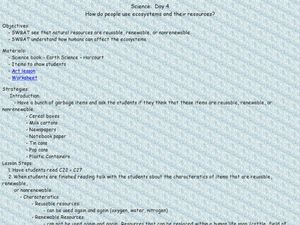Curated OER
Tolerance Through My Eyes
Young scholars explore multiculturalism. In this visual arts instructional activity, students consider how visual arts may provide service opportunities and create artistic pieces inspired by service.
Curated OER
Using Current Events to Understand Elections
Eleventh graders explore the the major phases of the electoral process for president. For this US Government lesson, 11th graders compare and contrast the delegate system of nomination and the electoral college.
Curated OER
Writing Headlines
Students define the purpose of headlines and practice writing their own. In this news writing lesson, students define the elements of headlines and view examples. Students read a news story in groups and create a headline for it....
Curated OER
Lessons to be Learned: The Importance of Attribution, Accuracy, and Honesty
Students investigate real world examples of media law issues. For this media law instructional activity, students read Janet Cooke’s feature and respond to the writing. Students read articles by Stephen Glass to highlight facts in need...
Curated OER
Where journalism meets art
Students pick out the different techniques in photographs taken. In this photographs lesson plan, students critique patterns, shadows, reflections, and more in the photographs.
Curated OER
Through the Viewfinder: Learning to Think Like a Professional News Photographer
Students investigate the skills for photo composition to become quality photojournalists. For this photojournalism lesson, students cut out photographs from magazines and decide on the best ones, as well as determine what makes them...
Curated OER
Making Headlines
Students identify acts of kindness in the news. In this random acts of kindness lesson, students discuss kindness, find a news article about an act of kindness that took place in another country, locate the country on a map, and write a...
Curated OER
Now We Teach Six Rs
Students explore recycling. In this ecology lesson, students sort classroom garbage into items that can be reused, reduced, or recycled. Students brainstorm ideas for reusing items and discuss ways to celebrate Earth Day at home.
Curated OER
Our Unfinished Work
Students investigate the racism elements after the election of President Barack Obama. In this racism lesson, students read a recent article about 'post-racial' society. Students compile a list of achieving a post-racial society and...
Curated OER
Prairie Voices: Where People Come From
Students examine the human experience. In this migration lesson, students determine reasons for migration, discover the traits of cultural groups, and explore how groups of people come to share their experiences despite language,...
Curated OER
Critical Consumerism
Students identify the role of advertisements in their environment. For this advertisement lesson, students find advertisements in their classrooms and discuss them. Students write a definition for advertisements and identify related...
Curated OER
Burning a Hole in Your Pocket
Students solve word problems. In this money lesson, students solve math word problems dealing with money and then write down all the steps necessary to solve the problems. Students use given websites to practice more math problems.
Curated OER
Revealing Process
Students investigate the method of collage in art in part of a study of Dada and Surrealist art. In this art analysis lesson, students explore how artists incorporated materials from everyday life into their art works. Students complete...
Curated OER
Tour + Workshop = DESIGN: Form Follows Function
Students design a chair with function in mind. In this design lesson plan, students design a chair out of newspaper that is strong enough to hold a "peanut ball". Students discuss how the form follows the function. This lesson plan...
Curated OER
Everyone has Interesting Stuff
Students examine a random collection of artifacts. In this deductive reasoning and cultural awareness lesson, students will pair up and examine a given artifact. Each student will attempt to use the artifact's attributes and apparent...
Curated OER
A MATTER OF PERSPECTIVE: COLUMBUS IN THE NEW WORLD
Eighth graders study the famous explorer Christopher Columbus. In this World History lesson, 8th graders analyze and compare primary and secondary sources. Students discuss as a class the accomplishments of Columbus.
Curated OER
Teenagers and cleaning
In this teenagers and cleaning worksheet, students choose the correct word to complete the sentences about teenagers and cleaning. Students complete 10 multiple choice questions.
Curated OER
Idioms Quiz: Money 3
For this English idioms worksheet, students interpret the meaning of phrases having to do with money. Students complete sentences using the meanings of the phrases.
Curated OER
It's Your Birthday! Expository Writing Unit 2
Students create an expository essay. For this writing lesson Students are assigned a country and must conduct research surrounding a historic event that occurred in that country at the time of their birth.
Curated OER
How do people use ecosystems and their resources?
Students examine how natural resources are reusable, renewable or nonrenewable. In this ecosystems lesson students see the effects humans have on ecosystems and complete an art lesson activity.
Curated OER
Add Me!
In this present tense worksheet, students fill in the blanks to sentences and write the name of the tense that the sentence is in. Students complete 35 questions total.
Curated OER
Earth Day - Reduce - Reuse - Recycle
In this Earth Day worksheet, students fill in the blanks to sentences, match words to definitions, and make slogans for pictures about reducing, reusing, and recycling. Students complete 3 activities.
Curated OER
I'm a Celebrity, Get Me out of Here
Learners examine the presence of the paparazzi. In this media awareness lesson, students visit the noted Web sites to determine the influence and support that the paparazzi enjoys in modern society. Learners create guides to the paparazzi.
Curated OER
English Exercises: Present Simple Tense
In this online interactive English worksheet, students respond to 26 multiple choice questions about pronoun agreement. Students may submit their answers to be scored.

























